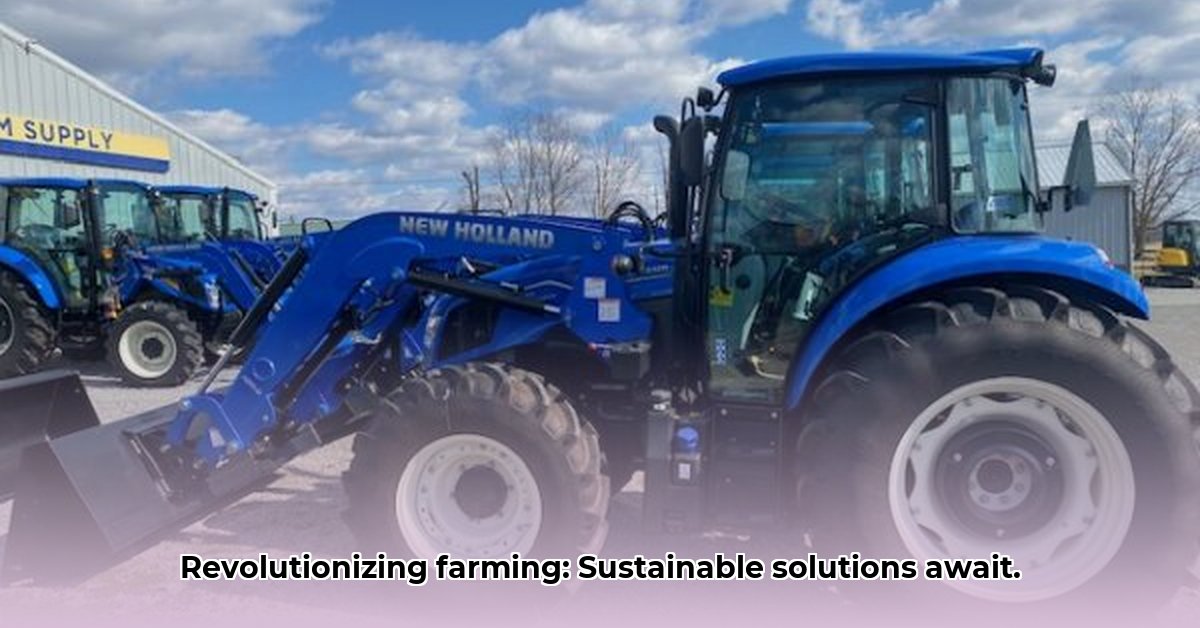
This informational report assesses the New Holland Boomer series tractors' suitability for sustainable agricultural practices. We analyze their inherent features and the potential impact of aftermarket modifications, highlighting data gaps and offering actionable insights for various stakeholders. While we aim for comprehensive analysis, limited publicly available technical specifications constrain some aspects of our evaluation. For more information on New Holland compact tractors, see this site.
Overview of the Boomer Series: A Compact Tractor's Sustainability
The New Holland Boomer series comprises compact tractors targeting homeowners, landscapers, and part-time farmers. Horsepower ranges from 35 to 55, suitable for various tasks. However, a significant limitation of this analysis is the scarcity of detailed technical specifications, including precise fuel consumption and emissions data. This lack of transparency from New Holland restricts a complete evaluation of the tractors' long-term sustainability.
Detailed Analysis: Bridging the Data Gap
This section examines the Boomer tractors, noting both known features and significant informational voids.
Fuel Efficiency and Emissions: A Critical Data Deficiency
A major obstacle in evaluating the Boomer series' sustainability is the absence of comprehensive fuel efficiency and emissions data. Without this information, we cannot accurately assess their environmental impact. Independent testing and greater transparency from New Holland are essential to address this critical data gap. This lack of data prevents meaningful comparison with competitors.
Maintenance and Durability: Assessing the "Easy Maintenance" Claim
New Holland promotes "easy maintenance," but this requires rigorous verification. Detailed maintenance schedules and long-term durability data are needed to substantiate this claim. Without such data, potential long-term repair costs remain unclear, hindering a complete sustainability assessment. Predictable maintenance is essential for long-term cost efficiency.
Aftermarket Cabs: The Sims Cab Depot Advantage and Risks
Sims Cab Depot provides aftermarket cabs for Boomer tractors. These improve operator comfort, safety, and potentially productivity. However, this upgrade incurs additional costs and may introduce compatibility challenges. Moreover, the long-term durability of these aftermarket cabs needs thorough evaluation.
(Risk Assessment Matrix)
| Risk Factor | Likelihood | Impact | Mitigation |
|---|---|---|---|
| High Maintenance Costs | Moderate | High | Preventative maintenance, detailed schedule adherence. |
| Poor Fuel Efficiency | Moderate | Moderate | Fuel usage tracking, comparison with similar tractors. |
| Lack of Environmental Data | High | Moderate | Advocate for New Holland transparency; support independent testing. |
| Poor Operator Protection | Moderate | Moderate | High-quality cab investment, operator safety training. |
| Cab Compatibility Problems | Low | Moderate | Thorough compatibility checks before purchase. |
Competitor Comparison: A Data-Constrained Perspective
Comparing the Boomer series against competitors like Kubota or John Deere is hampered by the limited available data. More comprehensive technical specifications from New Holland are needed to facilitate a fair comparison. This comparison would be significantly improved by access to standardized, independently verified testing data.
Sustainability Assessment: A Partial Picture
Given the absence of crucial data on fuel efficiency, emissions, and long-term durability, it’s presently difficult to definitively assess the Boomer series' contribution to sustainable agriculture. New Holland's enhanced transparency regarding technical specifications is vital for a more comprehensive evaluation.
Actionable Insights: Guidance for Key Stakeholders
This section provides practical advice for various stakeholder groups:
1. Homeowners and Part-Time Farmers:
- Carefully assess individual needs before purchasing. Don't solely rely on brand recognition.
- Consider the cost-benefit analysis of an aftermarket cab, weighing increased comfort and safety against the added expense.
- Maintain detailed records of operating and maintenance costs to evaluate long-term financial implications.
2. New Holland:
- Release detailed technical specifications, including fuel efficiency and emissions data. Transparency builds customer trust.
- Invest in research and development to enhance the sustainability of your products, focusing on fuel efficiency improvements and emissions reduction.
3. Sims Cab Depot:
- Conduct and publish independent durability testing of your aftermarket cabs to demonstrate reliability and longevity.
- Explore partnerships with New Holland to ensure seamless integration and optimized compatibility.
Regulatory Compliance: A Continuous Imperative
Compliance with emissions and safety regulations is crucial. Research local and regional standards, applying this to both the tractors and any aftermarket additions. Staying informed about evolving regulations is of paramount importance.
Conclusion: The Need for Transparency and Improved Sustainability
The New Holland Boomer series presents a mixed perspective. Its suitability for sustainable agriculture is currently limited by the lack of crucial technical data. Transparency from New Holland, along with independent testing and long-term durability studies, are crucial for a complete evaluation of the tractors’ overall impact on sustainability. Improved design and enhanced aftermarket solutions hold significant potential for improving environmental performance.